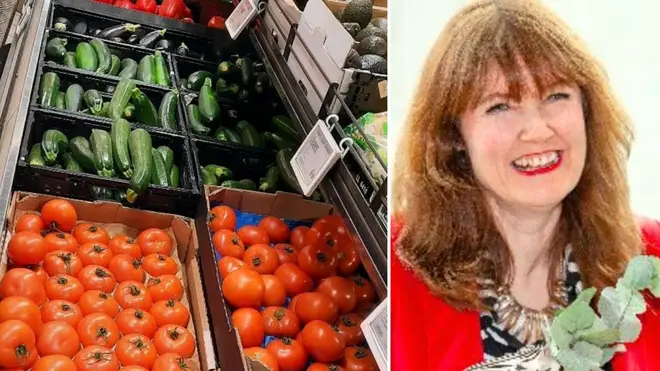
Oli Dugmore 4am - 7am
23 February 2023, 15:31 | Updated: 23 February 2023, 15:37

I am sitting in sunny south of France with a fridge full of tomatoes, peppers and cucumbers.
I am not boasting or being smug just sharing my reality whilst back in Blighty, you are being rationed with a measly three units per person - if you can even find them.
And in my opinion, it is very little to do with Brexit and more a question of economics.
The UK produces just 54% of its vegetables and a measly 16% of its fruit.
The rest is imported. If you compare this to France who produces over 100% of the country’s food needs - in fact in a 2010 report it showed that only Australia and USA are more self-sufficient in terms of feeding their own people.
The UK needs to import because it has decided, economically, this is the best way forward and, in the main, it has enabled the British to enjoy low food costs as the supermarkets source the best prices and the tightest specifications from the cheapest sources.
The only additional challenge that Brexit has made to this situation is the slow replacement of farmers subsidies which they were getting from the EU and therefore the fact that many farmers have decided to grow something else or stop altogether because they just cannot make ends meet. But that is just a small part of the equation.
There has been a perfect storm – or hailstones and snow where it shouldn’t be – that is impacting supply as Spain and Morocco have had a bad winter impacting on supply and quality, coupled with increasing costs of energy, transportation and labour.
So the problem becomes very simple - one of the economics of supply and demand.
And who is prepared to put their money where their literal mouths are.
If we take the example of tomatoes, the UK grows their own and they are probably some of the loveliest tasting you can buy.
But mainly in the summer and outside the season, we source them from the Netherlands which for me are lacking in taste but are perfectly formed.
The rest come mainly from Spain and Morocco, who have been having unseasonably bad weather, which means they have had a poor growing season and there is a shortage. Or now the Canaries, Poland and wherever else there are some left.
As there is not enough to go around, those who are prepared to pay, are getting the goods.
And this is the really critical part about France vs UK.
In France we have been paying way more than the Brits for a long time because the French are prepared to pay more for their food, plus France does grow a lot of its own produce.
Today, there are 30 different types of tomatoes on the Carrefour website of which 20 were grown here in France.
The rest are a combination of Morocco, Spain and the Netherlands – different sizes and colours.
And they range from e2.89 per kg for simple round tomatoes to French vine at e5.39 per kg.
Compare that to Tesco UK vine tomatoes at £2.50 per kg and you can begin to see the problem. Nearly double the price if you can get them!
But it’s not just tomatoes – Look at these prices in my local Carrefour compared to online UK prices (note that there was not one veggie out of stock!) Cucumbers: Carrefour £1.84 - Tesco 75p. Onions per kg: Carrefour £2.63 - Tesco £1. Cauliflower: £2.71 - Asda £1.80. Red Pepper each: Carrefour £1.10 - Tesco 55p
So what is the solution?
If the UK is going to solve this problem, there are three choices:
Or try buying cheaper versions such as tinned and frozen or even growing your own! Winter vegetable soup anyone?